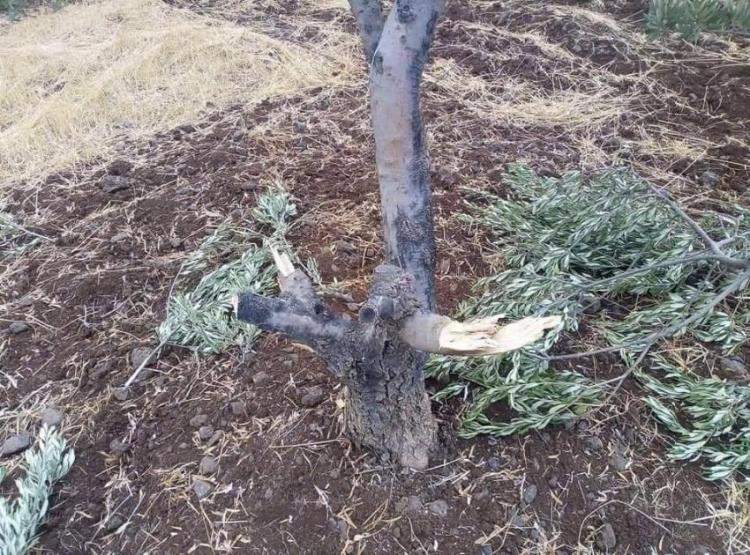As-Suwayda- North-Press Agency
On an area of more than 650 hectares spread across the northeastern hills of the city of As-Suwayda in southern Syria, a natural forest reserve known as the Dhamna Reserve rises 1200 meters above sea level and includes types of rare and perennial trees, in addition to providing shelter since for dozens of species of wild animals since 2001.
Deforestation
Like many facilities and natural resources in Syria, from the beginning of the Syrian crisis in 2011 until now, the reserve was severely damaged as a result of logging by timber dealers and individuals, as a result of diesel shortages and the tendency of people to use wood to get warmth in winter.
The first recorded incident of an incursion on the reserve dates back to the end of December 2013, when a number of wood thieves robbed it and cut hundreds of perennial oaks and seedlings, as the amount of wood they saw at that time was estimated at 100 tons.
Anas Abu Fakhr, head of Forestry at the Cultivation Department of As-Suwayda, told North-Press that "the inability of the population to get free diesel due to its high price, made these forests a target for crisis dealers and timber thieves and a quick way to profit."
In the fall of 2015, Dhamna was again subjected to extensive logging. Hundreds of atlas, oak, cranberry, and hawthorn trees were affected, as the price per ton of wood reached around 35,000 SYP, when the dollar exchange rate at the time was 150 SYP to 1 dollar.
In the winter of 2016, a gang was arrested while cutting wood in the reserve. They had about 50 tons of wood and were referred to court.
Seasonal guards
Abu Fakhr added that the reserve suffers from a limited number of guards, as in 2018 they decreased to fifteen forestry guards, which is not enough to guard the vast areas of the reserve.
Dhamna, according to the estimates of the Forestry Department, needs at least thirty guards, which prompted the responsible authorities in the Directorate of Agriculture to appoint seasonal guards.
In September 2018, the reserve was attacked by Syrian soldiers serving in the 44th regiment, adjacent to the boundaries of the reserve from the northwest, who cut down dozens of oaks and other trees.
At that time, the incident met with great anger in As-Suwayda, and the forestry department pointed the finger at officers serving in this regiment.
The role of civil society
Civil society had a prominent role during the war years in protecting the reserve and the rest of the forests in the governorate. Abu Fakhr emphasized that hundreds of young people volunteered to protect them, as they were organized into reconnaissance and protection teams and erected their tents in the woods.
In the past three years, a civil organization has been formed that cares for the environment, planting trees and protecting forests from human damages. The “Sons of Oak” organization includes thousands of young men and women from As-Suwayda, and has contributed to planting thousands of trees in the affected areas with the support of people from Jabal al-Druze (Jabal Al-Arab).
Recent fires
On May 21, the reserve was subjected to a major fire that lasted for many hours. Fire engines, with the help of civilians, were able to put it out, which was the first time that they faced fires.
The Directorate of Agriculture in As-Suwayda estimated the area of land damaged by the fires at 2,500 acres, in excess of 500 oak trees, wild pines, cranberry and sumac trees, and ten thousand forest trees were damaged.
Al-Seir square, located opposite As-Suwayda city council, witnessed a protest in which dozens of the city's residents participated after several fires in the region, including agricultural fields and large areas of Dhamna Reserve east of Suwayda, where the protesters demanded the Syrian government assume its responsibilities regarding recent and repeated fires.
The importance of the reserve
The reserve rises 1200 m above sea level, and is considered one of the most important natural reserves that include the richest medium-density forests in As-Suwayda, because it contains rare and perennial trees such as oak trees, Atlantic ducks, mulle trees, raspberries, wild pines, cherry Prunus Mahaleb and many forest trees. Evergreen trees cover about 95 percent of the reserve, iIn addition to dozens of natural plant species such as chamomile, nettle, and wild thyme, which are required for the pharmaceutical industry, in addition to rare aromatic herbs such as lavender, coriander, and mushrooms.
Khalid Hamid, the director of agriculture in As-Suwayda, believes that the oak trees are about two hundred years old or more, and that everyone should work to protect this rare natural wealth from damage resulting from fires or unauthorized logging.
The area has been declared as an environmental reserve in accordance with Resolution No. 35 of 2001 in order to preserve the plant and animal diversity in it, with an area of 6,531 acres, which equals more than 650 hectares of basalt rocky land.
Since its establishment, the reserve has contributed to protecting many types of animals such as hyenas, wolves, foxes, squirrels, rabbits, large snakes, and various types of endemic birds such as partridge and mountain owl, in addition to seasonal migratory birds such as storks, ducks, hawks, eagles, and others.
Dhamna Reserve, in addition to the al-Lajat Reserve in As-Suwayda, are two of the 24 natural reserves in Syria, the majority of which were severely damaged as a result of the country's crisis.

